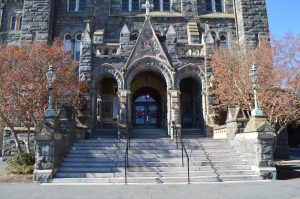Welcome, ambitious scholars! Your arrival at Georgetown is the result of years of late-night study sessions, determination, and perhaps a dash of serendipity and privilege. Some of you may be eyeing the glitzy world of finance, the puzzle-solving realm of consulting, or the high-stakes arena of politics. Others are drawn to the noble calling of being “people for others,” seeking opportunities in “global development” with visions of rescuing the downtrodden from far-flung corners of the world. You likely wrote about changing the world in your supplemental essays, and that it’s at Georgetown where you’ll learn how to.
But before you jump into any world-saving endeavors, let’s pause and think about how to prepare for these challenges. If you have volunteered locally or or tried to find solutions for problems like gun violence or homelessness here in DC, you have likely learned that these are maddeningly complex. It is tempting to think that a dysfunctional school in the “Global South” is easier to fix, but is that really true?
In 2010, two Harvard grads thought so. They set up the Bridge International Academies, a low-cost private school network that was widely touted as the “Tesla of education” for providing “technology in a box” to set up cheap private schools in impoverished communities in Africa and India. Despite backing from Bill Gates, Mark Zuckerberg, and the World Bank, and the partnership with Nobel prize winning economist Michael Kremer for an the impact evaluation, the project was marred by allegations of corruption, sexual abuse and human rights violations.
This story, featuring a full “anti-poverty superhero team” of tech innovators, academics, and local partners, isn’t unique. While mobile phones have achieved global ubiquity, more niche technological solutions for the poor, like solar ovens, blood delivery drones, stripped down cheap laptops for slum dwellers, and a merry-go-round that pumps clean water, have failed to achieve scale. Poverty alleviation, it turns out, has no quick-fixes.
Curiously, academic impact evaluations of these technologies report positive outcomes from small-scale randomized controlled trials. These studies, conducted by organizations like Jameel Latif Poverty Action Lab, Innovations for Policy Action and our very own Georgetown University Initiative on Innovation, Development and Evaluation (Gui2de) are often outstanding works of science. They feature original data, sophisticated statistical techniques, and elegant interpretations of empirical results. These studies are routinely published in top ranked academic journals and inspire some students to take the academic path towards a PhD in economics or a related discipline. [Disclaimer: this was my path, so I am biased.]
For students who are more interested in going out into the world however, these papers can obscure a crucial reality: there is a world of difference between studying a policy, program, or technology in a controlled environment and implementing it at scale. In the real world, efforts to introduce new technologies can be controversial. Grassroots perspectives, often unwritten and shared in local networks, elude even the best scholars. The Bridge schools in Kenya, for example, bypassed teacher unions and safety regulations. Locals had plenty to say about it, but Michael Kremer’s impact evaluation focused on documenting the improvements in test scores (which did go up).
Are “experiential learning” programs, such as SFS Centennial Labs, where students travel to distant locations for firsthand observations, a solution? My limited experience suggests otherwise. These field trips often present students with experiences that are curated by their professors and hosts, who themselves lack deep roots in local communities. The local experts invited to address students cannot represent the full spectrum of voices. And even when students do hear concerns from the community, the dissent can be dismissed as a challenge to overcome with perseverance. All of us, whether we mean to or not, gravitate toward saviorism.
With this in mind, how do we unlearn this type of saviorism? How can you, a Georgetown student, prepare for a career or further study in this space? Over my 15-year tenure teaching at the School of Foreign Service, I have been asked this question countless times. This summer, I finally took the time to distill my thoughts into five key pieces of advice. Disclaimer: these are just opinions, based on my own personal journey from a small city in India, to Reed College, Yale University, to the University of Chicago then Georgetown—each of these brings its own biases.
Recognize the complexity of other people’s problems: It is easy to think that distant challenges have simple solutions. A Silicon Valley startup might envision solving education gaps in Indian slums with a tech box and an Indian policy maker might suggest curbing U.S. gun violence through mass confiscation. Both oversimplify complex issues shaped by history, culture, politics, and economic disparities. As a student, don’t believe you can only search for the easy answers. Embrace complexity and highlight the nuances you run into. Question the assumptions made by experts you read. There is no major or minor at Georgetown that hands you these skills on a silver platter. You have to make that effort on your own. The magic moments happen while writing long papers in the library, not on a tour of the World Bank.
Specialize in a discipline before you embrace interdisciplinarity: Just as fusion food tastes best when the chef is first trained in a specific culinary art, a strong disciplinary foundation is essential for interdisciplinary thinking. Sometimes, you can get this mix of ideas in the confines of a single class. My class, GHDP 2252 entitled “Introduction to Development Studies: Theory, Methods and Practice,” is heavily anchored in economics, but it also features smatterings of literature as well as perspectives from history, anthropology and political science. But not all classes can, or should, feature this learning goal. It is on you, the student, to create a good mix of classes for yourself. So make sure that you are gaining expertise in one discipline, but also taking classes that challenge the assumptions of that discipline. The major and minor you pick matters a lot less than the right mix of classes in your record.
Read outside of your comfort zone: If you grew up in the United States or Europe, you may think of human progress as synonymous with industrialization, democratization and globalization, with modern education as a catalyst. It is time to reconsider such thoughts. China has used a very different model to uplift a billion people out of deep poverty. And everyone is now caught between the incompatible goals of economic growth, environmental sustainability and cultural autonomy. One person’s utopia is another’s dystopia. So read the voices of people who are outside your comfort zone. Make world literature your passport. This will fill a crucial gap in your technical training: empathy for viewpoints unlike your own.
Build research skills to tap into local knowledge: Every community, no matter how resource-poor, harbors a wealth of indigenous wisdom embedded in their art, music, oral traditions, and customs. These unpatented, often overlooked knowledge systems contain vital insights into local beliefs, narratives, and identities. To truly understand and contribute to global development, cultivate not only those technical quantitative skills that you saw featured in academic papers, but also the skills that help you tap into this rich cultural tapestry of local communities. Learn how to interview, observe, and interpret people and their forms of expression. This will help you self-evaluate and course-correct when working in communities where you are an outsider.
Set a high ethical bar for mentors and role models: Many professors and campus visitors have impressive credentials. But before you stand in line for hours to be in their presence, scan their records for evidence of how they are as people. Have they upheld the dignity, rights, and well-being of the communities they have served? Are they aware of their own biases, assumptions, and the power dynamics that influence them? Are they open to debate? Set a high bar for your potential mentors. Ask them hard questions. These can mean far more than their impressive Rolodex cards of internship referrals.
As the Director of the Global Development Studies Minor, I will try to create these opportunities to grow. You will also get many of these, and more, learning opportunities in the next generation of syllabi that meet the new Diversity requirement. As a professor who was fortunate enough to serve on that committee, I can attest to the enormous effort we put into that curricular reform. The results will soon, hopefully, speak for themselves.
Preparing for meaningful engagement with impoverished and marginalized communities extends beyond any single course, requirement, major, or minor. You don’t have to travel or score an internship at the World Bank either. Your challenge is to unlearn your biases and avoid the savior complexes that the leaders of the past harbored. To make a real difference, you must learn to listen deeply and approach communities with humility, recognizing their inherent strengths rather than viewing them as problems to be solved. It’s crucial to challenge the systemic power structures that perpetuate global inequities—including those from which you might benefit. Your college years offer a unique opportunity to develop these critical skills and perspectives, laying the foundation for a lifetime of ethical, impactful engagement. Good luck!




